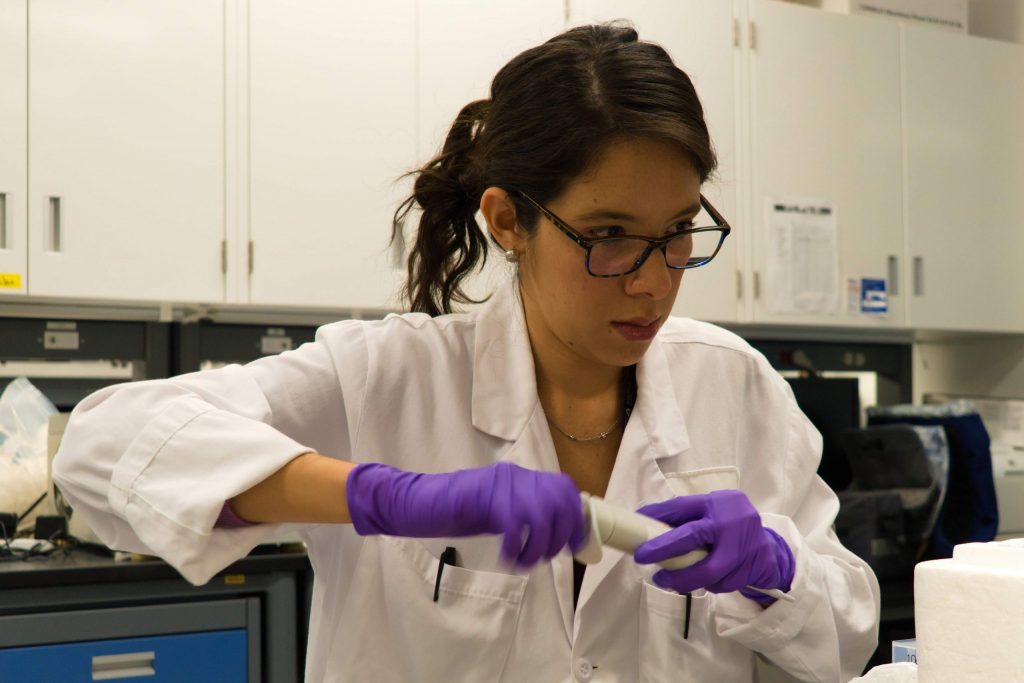Canadian researcher makes potential life-saving breakthrough in eye cancer research

Posted November 27, 2021 4:39 pm.
Last Updated November 27, 2021 5:45 pm.
A Montrealer has made a serious breakthrough in eye cancer research.
PhD candidate researcher Prisca Bustamante developed the world’s first non-invasive blood screening test for the most common eye cancer found in adults.
The breakthrough in Bustamante’s cancer research granted her an award of outstanding innovation in 2021 presented by national innovation organization Mitacs.
“Cancer dominates too many lives,” said Bustamante. “There are current treatments but it is still dominating many lives. And in my personal story I have had people, loved ones, who I have lost, so oncology research is a personal interest.
“And this type of cancer because it is a rare type of cancer, there are people who are suffering this terrible disease and I would like to help them, their treatments and the way they are monitored.”
Her breakthrough is expected to have a global impact. She says the non-invasive blood screening test will be easily accessible and save lives by detecting cancer earlier.
“Intraocular tumours, uveal melanoma is a rare type of cancer however it’s the most common type of intraocular tumours in adults,” said Bustamante. “It’s asymptomatic so some patients may not know that they have it and they just find out because they got new glasses and they took some pictures in their eyes, so our test is proposing a methodology which we can detect this type of cancer earlier.”
Where regular testing would require a specialized machine and specialized staff, the Montrealer’s new approach would allow a regular blood test sample to be enough to detect a cancer cell and determine how severe it is.
“Our test is minimally invasive, it is a blood collection, so it’s accessible,” she said. “There are no side effects, a patient can go to an eye clinic, have their blood collected – the blood is going to be analyzed in the lab – and then go home. Without any side effects.”

Prisca Bustamante was presented an award by Mitacs for her breakthrough eye cancer research. (Credit: CITYNEWS/Felisha Adam)
Bustamante’s work started while doing her Master’s degree in Mexico, but it was when she started in 2018 at the McGill University Research Centre under Dr. Julia Burnier that she had a breakthrough in her research.
“Prisca is an extraordinarily intelligent and motivated student,” said Burnier, an assistant professor of medicine. “She seeks answers to all of her questions, she shows amazing initiative and I think that’s been a huge driver of the success of this project.
“To be able to provide this to a number of cancer types and patients with different tumours, we’ve initiated clinical studies in many different cancer types. And this is a really exciting time to be able to do research that might truly have an impact.”
Bustamante’s development in testing is currently being used in a clinical study at the McGill Academic Eye Centre. Seeing her research put to the test is something Bustamante is grateful for.
“When we saw our first positive results, we were absolutely happy,” she said. “We were extremely happy because it corroborates our hypothesis and it was to have this non-invasive test for patients.
“I feel such an honour that our work can be used at the clinic because that is our main objective. All our work we do in the bench, in the lab, it’s for the patient that finally our test can reach the clinical settings.”








